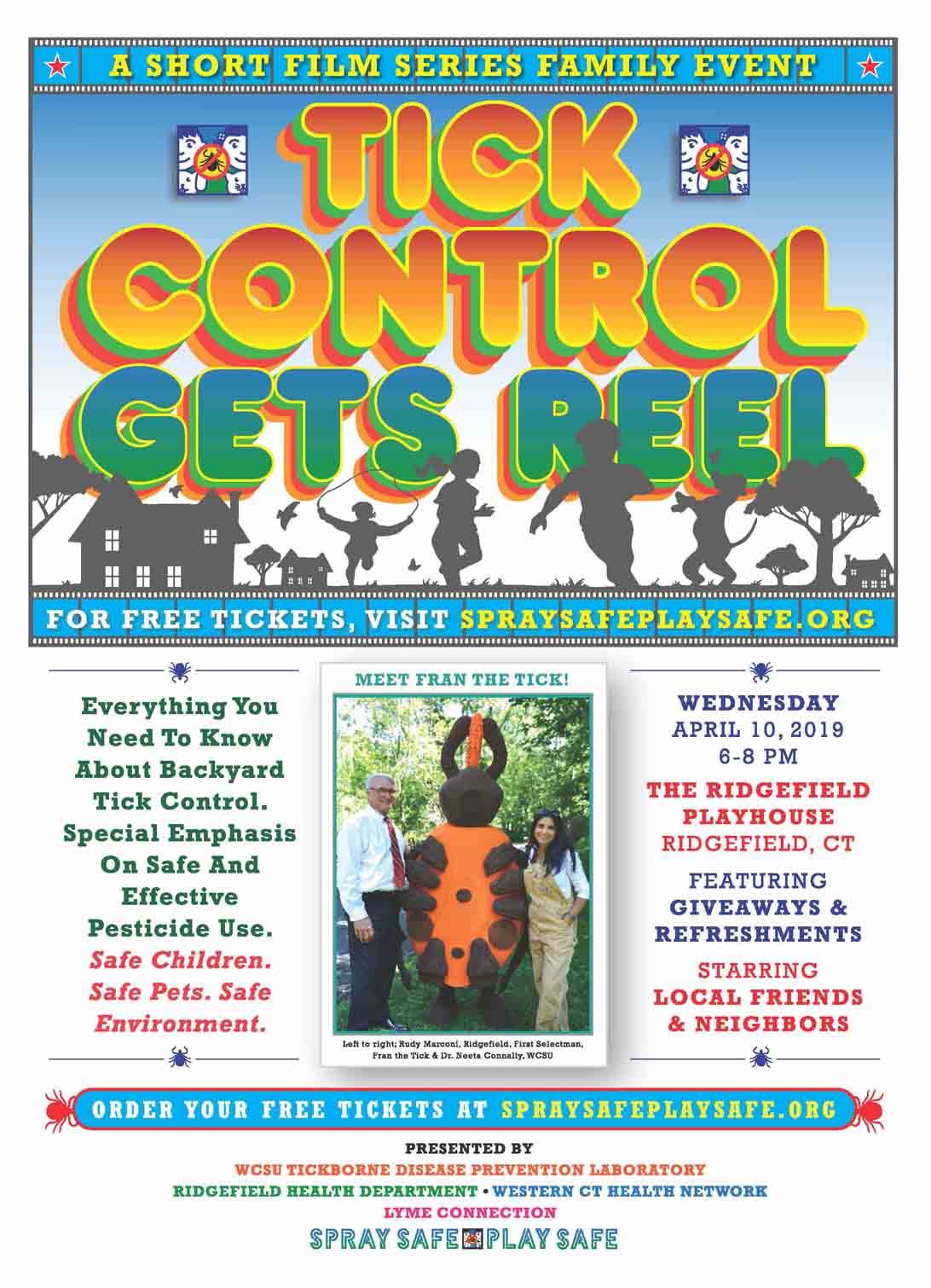
WCSU-Ridgefield film collaboration highlights tick risk management
A series of original film shorts presented by the Western Connecticut State University Tickborne Disease Prevention Laboratory in cooperation with the Town of Ridgefield Health Department to promote safe practices in preventing tick bites will premiere in a family-oriented event from 6 to 8 p.m. on Wednesday, April 10, at the Ridgefield Playhouse, 80 E. Ridge Road in Ridgefield.
“Spray Safe, Play Safe: Tick Control Gets Reel” will screen five film shorts, directed by WCSU Associate Director of Media Services and Instructional Technology Scott Volpe, that showcase healthy and effective practices in residential settings for control of tick populations and prevention of Lyme and other tickborne diseases. The films provide a wealth of science-based information about tick management and safe use of pesticides, presented in a story line that casts local residents in featured roles.
The screening event also will feature a tick-safe fashion show, photo ops with “Fran the Tick,” refreshments and giveaways. Admission is free and the public is invited; advance registration is required to obtain tickets. To register and for more information, visit www.spraysafeplaysafe.org. Sponsors include the TDPL, the Ridgefield Health Department, the Western Connecticut Health Network and Lyme Connection.
The film series has been produced as part of “Spray Safe, Play Safe,” a collaborative project of the TDPL and the Ridgefield Health Department funded by a $25,000 Heathy Communities Grant from the U.S. Environmental Protection Agency. The project team includes TDPL Director and Associate Professor of Biological and Environmental Sciences Dr. Neeta Connally; Jennifer Reid, coordinator of the Ridgefield Health District BLAST Lyme and Tickborne Disease Prevention Program; Integrated Tick Management Research Study Coordinator and Assistant Professor of Biological and Environmental Sciences Dr. Rayda Krell; and “Stay Safe, Play Safe” Project Coordinator Vicki Hornbostel. Film production expertise was provided by Volpe and staff at the WCSU Department of Media Services, with publicity support from Associate Professor of Art Jack Tom and art major Rachel Rossier.
The film shorts, each approximately three to five minutes in length, begin with a bus stop conversation among volunteer community actors portraying roles including a tick doctor, a mother fearful of ticks, her son unconcerned over tick risk, a newcomer to the area and a resident concerned over the environmental impact of pesticide use. The next two shorts present interactions between the tick doctor and local residents about tick behavior, tick-borne disease prevention measures ranging from personal protection and landscape modifications to chemical spraying, and practical information about safe pesticide use.
In the fourth video, the tick doctor reports on her experience in shopping at a local garden center for pesticides that are safe for the environment and effective in managing backyard tick populations. The final film in the series opens with the newcomer imagining in a dream sequence that she is conducting a “Bachelor/Bachelorette” style interview with pest management professionals to make a “tick manager” connection, before she awakens to a closing discussion at a block party with the entire neighborhood cast.
Connally observed that the films’ informal story-telling approach to communicating science-based information about tick risk management reflects a recognition that families with young children have a particular need to understand how to lower the risk of tickborne disease transmission.
“The reason we’re targeting this population is that the greatest number of cases of Lyme disease occur in children under 12,” she said. “Sometimes translating the science behind prevention can be difficult for homeowners and can be particularly scary for parents who want to keep their families safe. We hope our story-based film series can help clear up some of that confusion and alleviate some of the fears.”
Krell noted the films place special emphasis on appropriate products and applications for safe chemical spraying because studies have found that this prevention strategy is an area where community education is most needed. “Not every yard needs to be sprayed,” she said. “But when this is the right thing to do, you need to know what to use, when and where to use it, and how to do it safely. We want people to have good and reliable information based on research and science.”
Beyond the Ridgefield Playhouse premiere event, the objective of the “Spray Safe, Play Safe” project collaborators is to make the film shorts widely available to the public so that scientifically based information will guide individual action on tick management. Connally explained that wider dissemination of such guidance is especially important as species of disease-bearing ticks continue to expand from the Northeast to other geographic regions in the United States.
“We hope that as a result of these videos, people will feel more confident about making informed choices in decisions about controlling ticks in their backyards,” she said.
For more information, contact the Office of University Relations at (203) 837-8486.